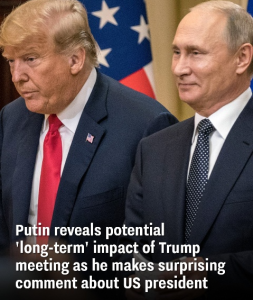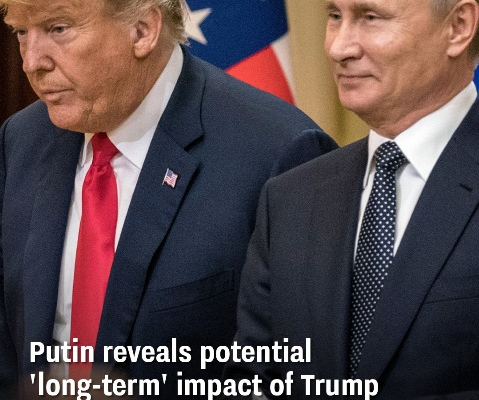Putin Reveals Potential ‘Long-Term’ Impact of Trump
Vladimir Putin’s comments and diplomatic maneuvers over recent months suggest that the Russian president sees Donald Trump’s leadership not merely as a political event, but as a potential turning point in the global balance of power. While he has not delivered one single sweeping address explicitly mapping out a “long-term Trump impact,” Putin’s public statements, carefully staged appearances, and policy cues reveal a layered strategic vision.
The picture that emerges is one of calculated optimism, tempered by an awareness of political unpredictability in Washington. Putin appears to view a Trump presidency as a window—one that could stay open for years—through which Russia might secure strategic advantages it has long pursued.
1. U.S. Political Distraction as Strategic Opportunity
One of the clearest elements in this vision is the idea that America’s domestic polarization will absorb much of Washington’s political energy. Under Trump, U.S. politics is likely to be dominated by internal battles, partisan investigations, and a constant media cycle focused on domestic controversies.
For the Kremlin, this offers breathing space. If Washington is consumed with itself, U.S. foreign policy bandwidth narrows, particularly in theaters less central to Trump’s agenda. That potentially reduces the urgency with which America pushes back against Russian influence in Eastern Europe, the Middle East, and even Africa. In short, Moscow gets more room to maneuver.
Analysts in Russia-linked policy circles have already suggested that a distracted America could ease pressure on Russia’s near abroad—places like Moldova, Georgia, and Belarus—where Western attention has traditionally limited Moscow’s ability to fully reassert its influence.
2. A Geopolitical Reset in the Making
Beyond the question of distraction, Putin seems to believe Trump’s return offers the chance for a more fundamental reset. The Kremlin may view Trump’s transactional style of diplomacy—emphasizing deal-making over values-based policy—as an opening to renegotiate the terms of U.S.-Russia relations.
This could range from revisiting arms control frameworks to reshaping global security priorities in ways that accept Russian spheres of influence. Under this model, Russia is not treated as an adversary to be contained, but as a great power to be bargained with on roughly equal terms.
To Putin, this would mark a profound shift from the post–Cold War consensus, which has generally sought to integrate—or pressure—Russia into a Western-led order. If Trump is willing to acknowledge Russia’s claims to influence in certain regions, that amounts to the geopolitical legitimacy the Kremlin has long sought.
3. Ukraine as a Litmus Test
No single issue more clearly defines the stakes of Trump’s potential impact than Ukraine. Putin has consistently framed the war as an existential security matter for Russia, while the West frames it as a defense of sovereignty and international law.
Trump’s past statements questioning the scale and duration of U.S. aid to Ukraine have been interpreted in Moscow as a sign that Washington might eventually accept a negotiated settlement favorable to Russia. If that happens, it would cement Russia’s territorial gains and validate Putin’s gamble on military force.
That said, Russian officials remain cautious. They understand that the U.S. foreign policy apparatus—Pentagon planners, career diplomats, and key members of Congress—will resist any abrupt withdrawal of support for Kyiv. Still, the perception that Trump is less committed to Ukraine than his predecessors already gives Russia psychological and political leverage.
4. Disruption of Western Unity
Another potential long-term effect lies in the cohesion of the Western alliance system. During Trump’s first term, his skepticism toward NATO funding commitments unsettled European capitals. Putin is likely betting that a second term could deepen divisions within NATO, especially if Trump again questions Article 5 obligations or pressures allies to strike their own arrangements with Moscow.
Even small cracks in alliance unity would have strategic consequences. A less coordinated NATO response to Russian actions would make it harder for the West to deter Moscow from pressing its advantage in contested regions.
European leaders have already voiced concerns about being sidelined in any direct U.S.-Russia discussions under Trump, fearing that key security decisions could be made without their input. For Putin, this kind of intra-Western friction serves as a multiplier for Russia’s influence.
5. The Multipolar Vision Gains Ground
For years, Putin has argued for a “multipolar” world order—one in which no single power or alliance dominates the global stage. Trump’s approach to foreign policy, with its skepticism toward traditional alliances and willingness to engage rivals directly, could accelerate the erosion of U.S.-led unipolarity.
In this environment, Russia can position itself as a central player among several major powers, balancing relationships with China, India, and others while leveraging occasional openings with the United States. If Trump’s tenure reduces America’s appetite for global leadership, Putin’s multipolar vision moves closer to reality.
6. The Risks in Putin’s Calculation
Despite the potential upsides for Moscow, there are risks. Trump is an unpredictable political actor, and his decisions can shift rapidly in response to domestic pressures or personal grievances. A sudden policy reversal—such as reimposing sanctions or increasing military support to Ukraine—could undercut any gains Russia hopes to make.
Moreover, a U.S. retreat from certain international commitments could embolden other powers, such as China, in ways that complicate Russia’s own strategic interests. While Moscow and Beijing often coordinate on opposing U.S. influence, they are also competitors in regions like Central Asia.
7. Signs of Strategy in Action
Recent diplomatic moves suggest Putin is already acting on this long-term view. The Alaska summit between Putin and Trump’s administration, for instance, is being used not only for public optics but also as a testing ground for how far the new White House is willing to shift its positions.
Observers note that Putin’s personal diplomacy—part charm offensive, part psychological testing—is aimed at creating an atmosphere in which concessions seem less like capitulation and more like pragmatic deal-making. This is classic Putin: using interpersonal dynamics to set the stage for geopolitical wins.
Conclusion: A Long Game With Uncertain Payoff
In sum, Putin’s vision of the “long-term impact” of Trump’s leadership rests on several interlocking expectations: a distracted America, a more transactional approach to diplomacy, weakened Western unity, and reduced U.S. support for Ukraine. Together, these factors could create an environment far more favorable to Russia’s strategic ambitions than the one that existed before.
Yet the Kremlin knows this is not guaranteed. Domestic U.S. politics are volatile, Trump’s policy instincts can be contradictory, and Russia faces its own internal pressures. The opportunity is real, but so are the risks.
For now, Putin appears committed to playing the long game—one in which patience, adaptability, and the careful exploitation of political moments could gradually shift the global order in Moscow’s favor. Trump’s presidency, in this view, is not the endgame itself but a potential accelerant, speeding Russia toward a geopolitical landscape it has long envisioned.


